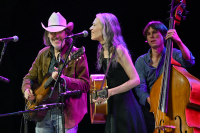By and large, I try to keep the night job out of this column. I love musicals, and even derive a gruesome gallows pleasure from the really bad ones but, since I review them for the Telegraph, it feels wrong to write about them here. And I don’t often listen to cast recordings of great shows at home either. If I want to hear numbers from the great American songbook — and I often do — I prefer the interpretations of Ella Fitzgerald, Billie Holiday, Sarah Vaughan and Fred Astaire, the last a man who sang as well as he danced, and always served the song rather than his own ego. An exception, however, must be made for the current production of Hair, now playing in the West End with the same American cast who first opened this glorious revival on Broadway.
For an old hippie like me, who saw the original London production in 1968 at the age of 13, this celebration of the flower power dream, and the darkness that shadows it, belongs in the canon of classic musicals. It’s a surprisingly bracing story of the way man’s fallen nature can destroy our hopes of a better world, and the energy and passion of the New York company leaves the audience moved as well as exhilarated. The show’s creators, Galt MacDermot (music) and Gerome Ragni and James Rado (book and lyrics), may never have repeated the success they had with Hair, but what a legacy they left in such hits as ‘Aquarius’, ‘Let the Sunshine In’, ‘Ain’t Got No’ and ‘Good Morning Starshine’. Many of the less famous numbers are almost equally fine — ‘Frank Mills’, in particular, has long struck me as a deliciously touching pop gem.
After seeing Hair again, I found myself going on a binge of psychedelia, digging out old albums by Jefferson Airplane, the Doors, Moby Grape, Cream’s Disraeli Gears and even the Stones’ much-derided Their Satanic Majesties Request, none of which I had listened to for years. They mostly stand up remarkably well, at least if you are prepared to buy into the hippie dream, and have fond memories of a misspent youth smoking dope at school when you should have been playing sport or getting on with your prep.
But if Hair is the pinnacle of the hippie era in the theatre, the high-water mark of the movement itself was surely the Woodstock festival, because a few months later at Altamont, in December 1969, it all turned sour, with the arrival of thuggish Hell’s Angels, frequent fights and a fatal stabbing. It felt like the end of the Swinging Sixties.
Enthused by my reborn love for all things hippie, I bought the DVD of Michael Wadleigh’s famous film of Woodstock, on which the young Martin Scorsese served as one of the editors. The director’s cut lasts almost four hours, with a further two DVDs of previously unseen performances. It still thrills.
The growing awareness of the organisers of just how big this thing was, the announcements about the dangers of ‘brown acid’, and the sublimely dotty notion of one of the MCs that if the half-a-million-strong crowd thought hard enough they might just be able to stop the rain are all wonderfully evocative of the spirit of the era.
The music is mostly terrific and watching the DVD I found myself dancing round the living room to Sly and the Family Stone’s amazing performance. Joe Cocker’s near epileptic rendition of ‘With a Little Help from my Friends’, with his bonkers air guitar playing, still packs a colossal punch and the closing set by Jimi Hendrix, set against images of the wasteland the site had become in the cruel light of dawn, sends shivers down the spine.
But as I watched, the last line of Browning’s beautiful poem about music and mortality, ‘A Toccata of Galuppi’s’, kept running through my head: ‘I feel chilly and grown old’. So many of the performers at Woodstock — Hendrix, Janis Joplin, Keith Moon, the Grateful Dead’s Pigpen, Canned Heat’s Bob Hite — died far too young. And though as a teenager I often wished I had been at Woodstock, my feeling now is a fervent sense of relief that I was spared the hassle, the unspeakable lavatory arrangements, the food and water shortages, and the loneliness that one often experiences in the midst of a great crowd.
I was afflicted forcefully by such feelings when the Telegraph sent me to write a piece on Glastonbury last year, a festival where one still catches glimpses of the great hippie dream in the good humour and patience of the audience. But as Yeats wrote, that is no country for old men. Unless a gun is pointed to my head, I will watch Glastonbury later this month from an armchair in my sitting room, with a comforting mug of PG Tips and a marijuana-free roll-up to hand.





Comments